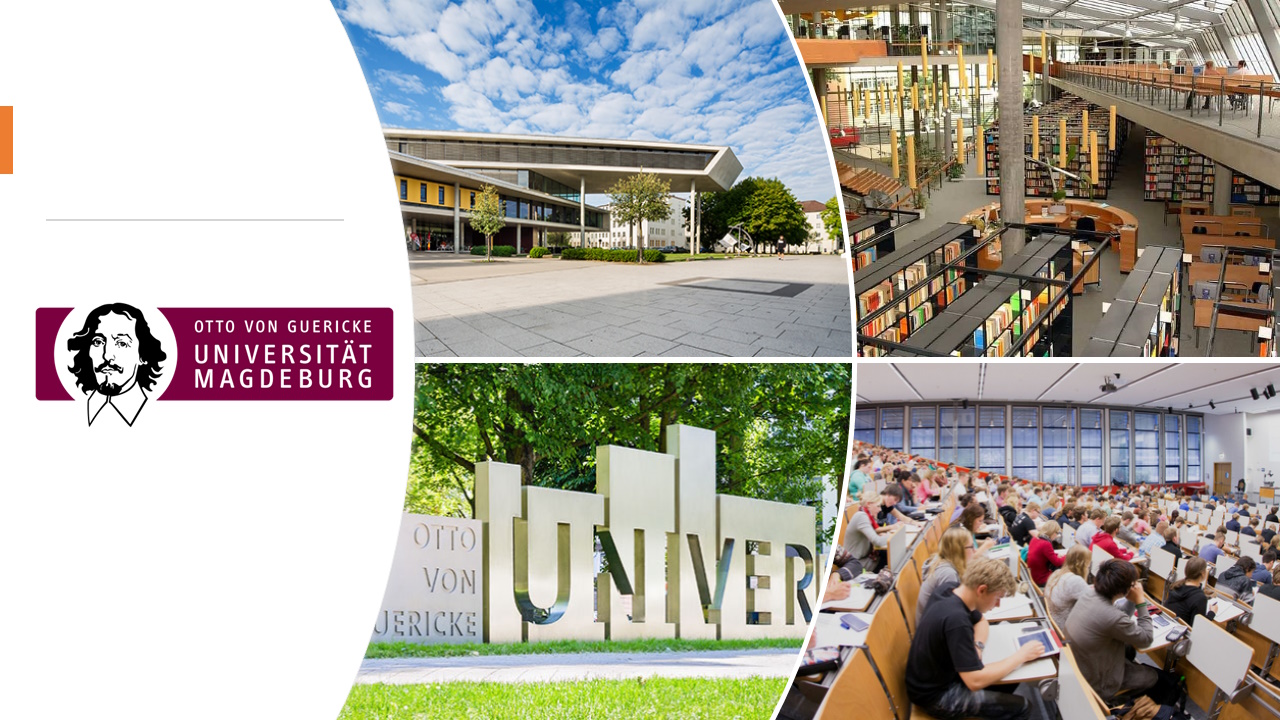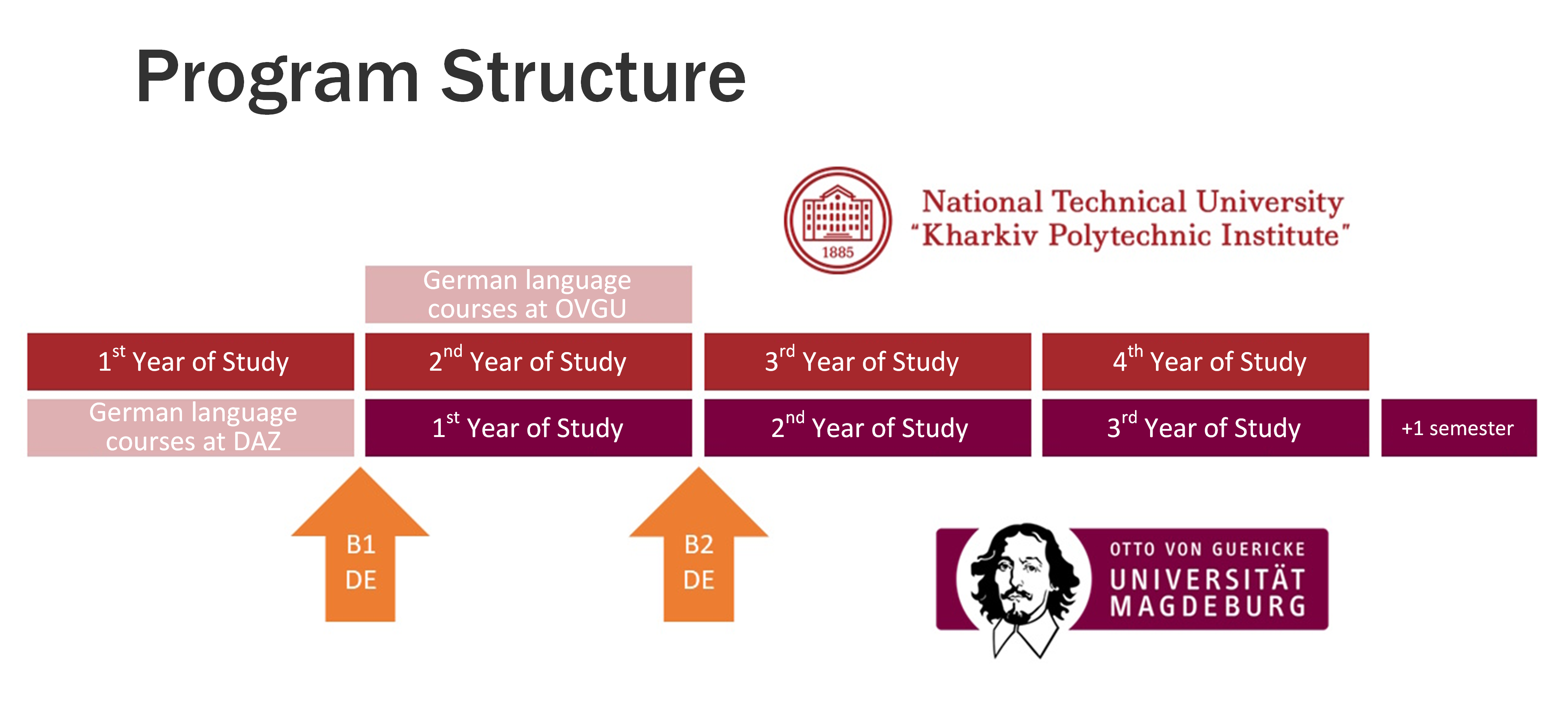General Information about the Program
The DSG2neo program is a joint initiative of the National Technical University “Kharkiv Polytechnic Institute” (Ukraine) and Otto von Guericke University Magdeburg (Germany) to provide educational support to graduates of Ukrainian schools who were forced to leave Ukraine and are currently residing in Germany with official status.
Considering the specifics of the German education system, graduates of Ukrainian schools cannot directly enroll in German universities immediately after finishing school in Ukraine. The developed program allows for a gradual adaptation to the conditions of studying at a German university, while saving both time and extra costs. Moreover, thanks to the harmonization of curricula between NTU “KhPI” and OVGU in selected majors, a student simultaneously studies the full academic content offered by both universities and gains the right to obtain a diploma from each side of the program.
You can find a more detailed description of theDSG2neo program, current contacts of coordinators, and admission requirements on the official program page on the NTU “KhPI” website.
Advantages of Participating in the DSG2neo Program
The DSG2neo program is your fast, guaranteed, and convenient path to obtaining an education at a prestigious German university!

Two diplomas – double advantage. Upon completion of the program, you will receive two diplomas – from the National Technical University “Kharkiv Polytechnic Institute” (Ukraine) and from Otto von Guericke University Magdeburg (Germany). This is your ticket to a successful international career!
Simplified language requirements. To enroll in the program, a B1 level of German is sufficient, whereas other universities typically require B2/C1.
Time saving. DSG2neo participants save 1 to 3 years by starting university studies without additional preparatory courses.
Study in the heart of Europe. Magdeburg is an ancient city with a rich history, the capital of Saxony-Anhalt. Here you will find vibrant student life, a modern campus, a multicultural environment, and proximity to Berlin.
Incredible opportunities. Sports, culture, modern technologies, and excellent prospects for your future career!
Requirements for Participation in the DSG2neo Program
To participate in DSG2neo and be admitted to Otto von Guericke University Magdeburg, an applicant must enroll at NTU “KhPI” in the first year of full-time study in one of the agreed specialties (Educational Professional Programs) and start studying online. After completing the first year, program participants are admitted to the first year at the German university and begin their studies in Germany as full-fledged students. The program provides for relocation to Magdeburg and accommodation in a dormitory.
What is required for admission to the German university:
- DSG2neo program participant certificate
- Secondary school graduation certificate (11 years) with a notarized translation of the appendix
- NTU “KhPI” academic transcript indicating the list of courses, hours, grades, and credits (issued to the program coordinator by NTU “KhPI” after the first year of study)
- German language proficiency certificate at least B1 (DTZ, TestDaF TDN3, Goethe-Zertifikat B1, TELC Deutsch B1, DSH1)
- German residence permit for temporary protection/official status
Program Structure and Duration of Study
The total duration of study is 4 years.
The first two semesters – online study at NTU “KhPI” according to a separate schedule.
Starting from the second year – on-site studies at Otto von Guericke University Magdeburg.

Harmonization with Specialty G7
The DSG2neo program involves several core fields of study, including specialty G7 Automation, Computer-Integrated Technologies, and Robotics, which is taught by our department (educational program “Computer Technologies and Programming in Automated Control Systems”). We have completed full harmonization of the educational program components with the Mechatronics program at OVGU.
Educational and Professional Program “Computer Technologies and Programming in Automated Control Systems” (EN) – Specialty G7 “Automation, Computer-Integrated Technologies, and Robotics”
Mandatory components of the educational program “Computer Technologies and Programming in Automated Control Systems”:
| Code | Components of the Educational Program | ECTS Credits | Form of Final As-mnt | Syllabus |
| 1. General Training (GT) | ||||
| GT01 | Foreign Language (English, German or French) | 12,0 | Credit /Exam | |
| GT02 | Ukrainian Language (for professional purposes) | 3,0 | Exam | |
| GT03 | History of Ukraine and Ukrainian Culture | 4,0 | Exam | |
| GT04 | Higher Mathematics | 18,0 | Exam | |
| GT05 | General Physics | 13,0 | Exam | |
| GT06 | Ecology | 3,0 | Credit | |
| GT07 | Philosophy | 3,0 | Credit | |
| GT08 | Jurisprudence | 4,0 | Credit | |
| GT09 | Introduction to the Specialty. Introductory Internship | 3,0 | Credit | |
| GT10 | History of Science and Technology | 3,0 | Credit | |
| GT11 | Sports and Physical Self-Improvement | 12,0 | Credit | |
| 2. Specialized (Professional) Training (ST) | ||||
| ST01 | Descriptive Geometry and Engineering Graphics | 5,0 | Credit | |
| ST02 | Programming | 10,0 | Exam | PDF1PDF2 |
| ST03 | Theory of Probability | 4,0 | Exam | |
| ST04 | Algorithms and Data Structures | 4,0 | Exam | |
| ST05 | Electrotechnics and Electromechanics | 4,0 | Exam | |
| ST06 | Information Theory | 4,0 | Credit | |
| ST07 | Metrology and Fundamentals of Measurements | 5,0 | Exam | |
| ST08 | Fundamentals of Electronics | 4,0 | Credit | |
| ST09 | Theory of Automatic Control | 6,0 | Exam | |
| ST10 | Fundamentals of Design Automation Systems | 5,0 | Exam | |
| ST11 | Fundamentals of Occupational Safety and Health | 3,0 | Credit | |
| ST12 | Organization of Databases | 5,0 | Exam | |
| ST13 | Team Project Work | 3,0 | Credit | |
| ST14 | Reliability and Diagnostics of Automation Systems | 4,0 | Exam | |
| ST15 | Microprocessor and IoT Programming | 4,0 | Exam | |
| ST16 | Technical Means of Automation | 6,0 | Exam | |
| ST17 | Software of Industrial Controllers | 6,0 | Exam | |
| ST18 | Fundamentals of Artificial Intelligence | 4,0 | Exam | |